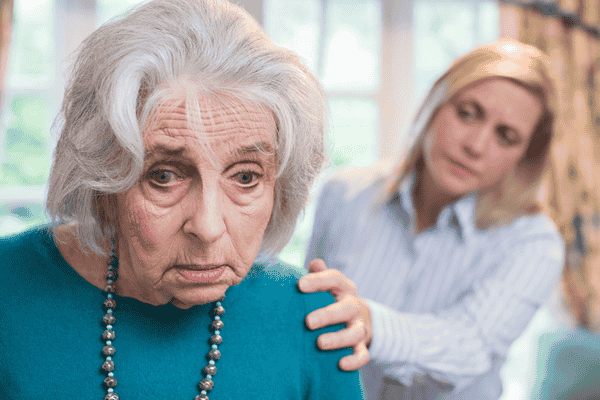Eleanor’s story begins like many others – at 78, she had always been the vibrant matriarch of her family, known for her infectious laughter and endless stories that brought life to every family gathering. Her garden was her sanctuary, a place where she spent countless hours nurturing beautiful blooms that reflected her own bright spirit. But recently, her family noticed subtle changes that seemed to dim her usual sparkle. The weekend gatherings she once eagerly anticipated became events she quietly avoided. Her beloved garden, once meticulously tended, began showing signs of neglect. Most concerning was the distant look in her eyes, replacing the warm twinkle that had always been there.
It was Eleanor’s granddaughter, Mia, who first voiced what others had been hesitant to acknowledge. During a quiet afternoon visit, finding her grandmother staring blankly at a television show she usually enjoyed, Mia gently asked, “Grandma, are you okay?” The forced smile that followed didn’t mask the profound sadness in Eleanor’s eyes, revealing a struggle that many older adults face in silence.
The Complex Nature of Late-Life Depression
Depression in older adults represents a silent epidemic that often goes unrecognized and untreated. Unlike physical ailments that manifest with clear symptoms, depression can masquerade as part of the natural aging process, making it particularly challenging to identify and address. The complexity of late-life depression lies not just in its symptoms, but in the intricate web of factors that contribute to its development and the unique ways it presents in older adults.
For Eleanor, the journey into depression wasn’t marked by a single event but rather a gradual accumulation of losses and changes. The death of her husband of fifty years had left an immense void, but initially, she had shown remarkable resilience. It was the quiet moments – the empty chair at the breakfast table, the absence of familiar footsteps in the hallway, the unshared observations about their shared garden – that gradually eroded her emotional well-being. Like many older adults, Eleanor didn’t recognize these feelings as depression, attributing them instead to the natural process of aging and grief.
The stigma surrounding mental health, particularly among older generations, adds another layer of complexity. Many seniors, like Eleanor, grew up in an era when mental health challenges were rarely discussed and often viewed as a sign of weakness. This generational perspective can create significant barriers to seeking help, leading many to suffer in silence rather than reach out for support.
Understanding the Root Causes
The path to depression in older adults often involves multiple interconnected factors. Beyond the profound impact of losing a spouse or close friends, seniors face numerous challenges that can contribute to their mental health struggles. Physical health problems, particularly chronic conditions like arthritis or heart disease, can create a constant backdrop of discomfort and limitation. The frustration of being unable to perform once-simple tasks can lead to a sense of helplessness and diminished self-worth.
Social isolation, particularly prevalent in our modern society, poses another significant risk factor. As mobility becomes limited and social circles naturally shrink, many older adults find themselves increasingly isolated. This isolation can be especially acute in regions like Ontario, where harsh winters can make it difficult for seniors to maintain regular social connections. The COVID-19 pandemic has further exacerbated this issue, creating additional barriers to social interaction and community engagement.
Financial concerns often weigh heavily on seniors’ minds, particularly those living on fixed incomes in areas with rising costs of living. The stress of managing limited resources while facing potential health care expenses can create a constant undercurrent of anxiety. For many, like Eleanor, who had always prided themselves on their independence and ability to contribute to their families, financial constraints can feel particularly challenging to their sense of autonomy and self-worth.
Recognizing the Signs: Beyond the Obvious
Depression in older adults often presents differently than it does in younger populations, making it crucial for family members and caregivers to be aware of subtle changes in behavior and demeanor. While persistent sadness might be present, it’s often not the most prominent symptom. Instead, physical complaints, changes in routine, and shifts in engagement levels might be more telling indicators.
In Eleanor’s case, her family first noticed changes in her daily patterns. The grandmother who had always been meticulous about her appearance began to show less interest in her grooming routine. Her usual practice of calling her children every Sunday evening became sporadic. The garden, which had been her pride and joy, started showing signs of neglect – not from physical inability, but from a lack of motivation and interest.
Sleep disturbances often serve as another key indicator of depression in seniors. Changes in sleep patterns, whether insomnia or excessive sleeping, can significantly impact overall well-being. Memory problems and difficulty concentrating might also emerge, sometimes mimicking symptoms of cognitive decline and causing additional concern for both the senior and their family members.
The relationship between physical health and depression creates a complex dynamic that requires careful attention. Chronic pain, digestive issues, and other physical complaints might actually be manifestations of underlying depression. Conversely, managing chronic health conditions can contribute to feelings of depression, creating a cycle that needs to be addressed holistically.
The Path to Recovery: A Multi-Faceted Approach
Eleanor’s journey to recovery began when Mia convinced her to speak with her family doctor. The physician’s gentle approach and understanding of late-life depression helped Eleanor feel comfortable discussing her struggles. Together, they developed a comprehensive treatment plan that addressed both the immediate symptoms of depression and the underlying factors contributing to her mental health challenges.
Professional support played a crucial role in Eleanor’s recovery. Through a combination of medication management and regular therapy sessions, she began to develop new coping strategies and perspectives. Her therapist helped her understand that seeking help wasn’t a sign of weakness but rather a demonstration of strength and wisdom. The support group she joined connected her with others facing similar challenges, reducing her sense of isolation and providing practical strategies for managing difficult days.
Family involvement proved essential in Eleanor’s recovery process. Her children and grandchildren worked together to ensure she had regular company and support. They helped her rediscover joy in her garden, starting with small projects that felt manageable and gradually building back to her previous level of engagement. Regular family dinners became a source of connection and purpose, giving Eleanor something to look forward to each week.
The importance of maintaining physical health as part of mental well-being became clear through Eleanor’s recovery journey. Her family helped her establish a routine that included gentle exercise, proper nutrition, and regular medical check-ups. They found that activities as simple as a short daily walk could have a significant positive impact on her mood and energy levels.
Depression in the elderly is not an inevitable part of aging but rather a treatable condition that requires understanding, patience, and appropriate intervention. Through Eleanor’s story, we see how recognition, support, and comprehensive treatment can help seniors reclaim their joy and engagement in life. For families and caregivers, being aware of the signs of depression and knowing how to respond with empathy and practical support can make a crucial difference in the lives of their loved ones.






It is appropriate time to make a few plans for the long run and it is time to be happy. I have learn this post and if I may just I wish to suggest you some attention-grabbing issues or advice. Perhaps you could write next articles relating to this article. I want to learn more issues about it!